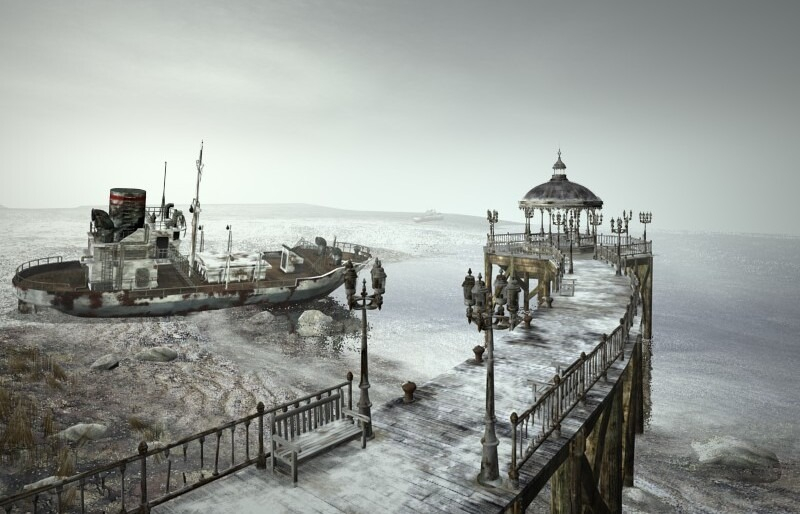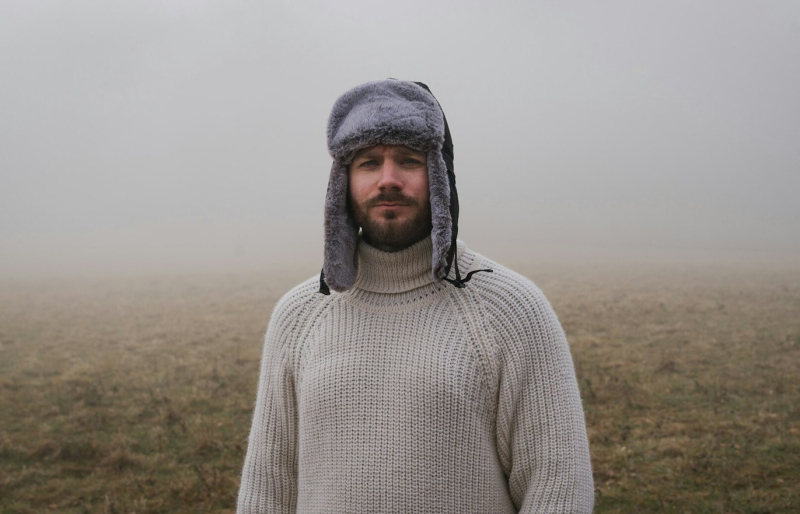So, why “cranberry”? Well, explanations differ – it may have come from a 19th-century travelog, a parody play, or even from the legendary novelist Alexandre Dumas. All versions agree on one thing: it all goes back to a translation error and a description of “wide-canopied cranberry trees” as something you’d find in Russia. And cranberries, as any Russian will tell you, actually grow on tiny shrubs, barely above the ground. For over a century now, the word has been synonymous with outlandish, exaggerated, and even fantastical images of “typical” Russian life.
Syberia

The chilly, vaguely-Eastern European landscapes of Syberia (2002). Credit: Wikimedia Commons / Anuman Interactive, CC BY-SA 3.0 DEED, cropped from original
I love how elements of Russian and Soviet culture are represented in the classic video game Syberia. My absolute favorite example of this is one of the locations, Komkolzgrad, an abandoned industrial city with huge and pretty terrifying statues of workers with sickles in their hands. I was also amused by some of the names chosen for Russian characters. The best one is undoubtedly Felix Smetana. Smetana means “sour cream” in Russian, plus it’s combined with an elegant first name of Latin origin… Something about it made me chuckle when I first played the game. However, as it turns out, there was a real Felix Smetana, too. – Kseniia
The Queen’s Gambit (2020)
The series was one of my few truly binge-watching experiences: my studies were fully forgotten for a couple of days as I immersed myself into the world of (slightly obsessive) chess playing. If you haven’t watched it, here’s the gist: Elizabeth, the main character, is a chess prodigy, winning competition after competition; naturally, she goes through lots of hardships, even struggles with addiction, and we follow along her transformations throughout the series.
The proverbial klyukva hits you slyly: once Elizabeth goes to Russia (spoilers!), the already gloomy-ish color palette of the series becomes even bleaker; the Russian chess opponent of the young prodigy is pure evil; and, in the scene that made me roll my eyes, a little waiter boy offers Elizabeth vodka with her breakfast as two strangers toast her in the background. However, there was a redeeming moment, too: in the finale, Elizabeth joins chess aficionados on a Moscow street, where she’s warmly greeted. Although I can’t tell how much of a klyukva that is, for I don’t know for certain if chess really was as popular in the USSR. But that had to be a nod to Russian hospitality. – Catherine
Overwatch 2
I have to admit I find it amusing to see the most stereotypical stereotypes about Russians coming alive in movies, books, or video games. Take, for one, Aleksandra Zaryanova, better known as Zarya, from Overwatch 2. Apart from her being a tank, which is worth a pat on the shoulder, there’re a couple of things about this character that crack me up every time: she has a strong Russian accent, she comes from Siberia, she has an attitude, and she mentions fuzzy bears at some point.
A particular kind of pleasure is to hear her saying phrases like “физкульт-привет” (a Russian greeting common among athletes) or “без труда не выловишь и рыбку из пруда” (a Russian analog of no pain, no gain). Though I am not saying that all this is complete nonsense, it’s the fact that it makes a full starter pack of a typical Russian that is so fun. – Marina



